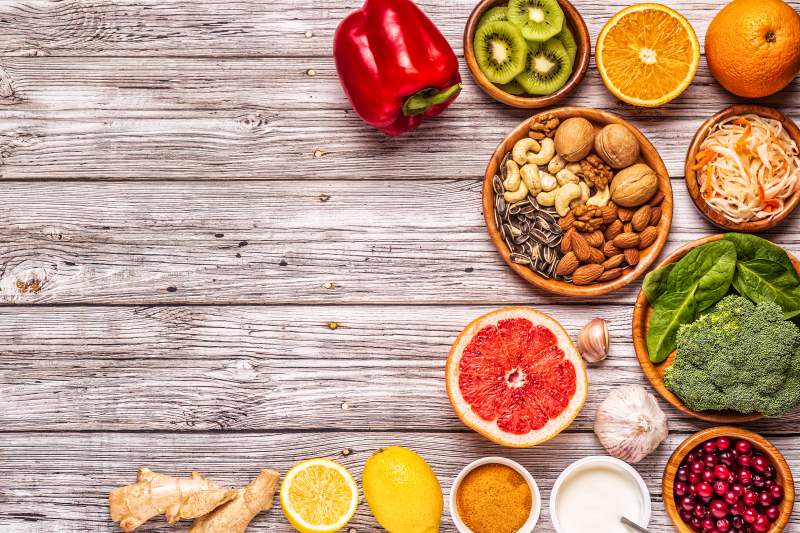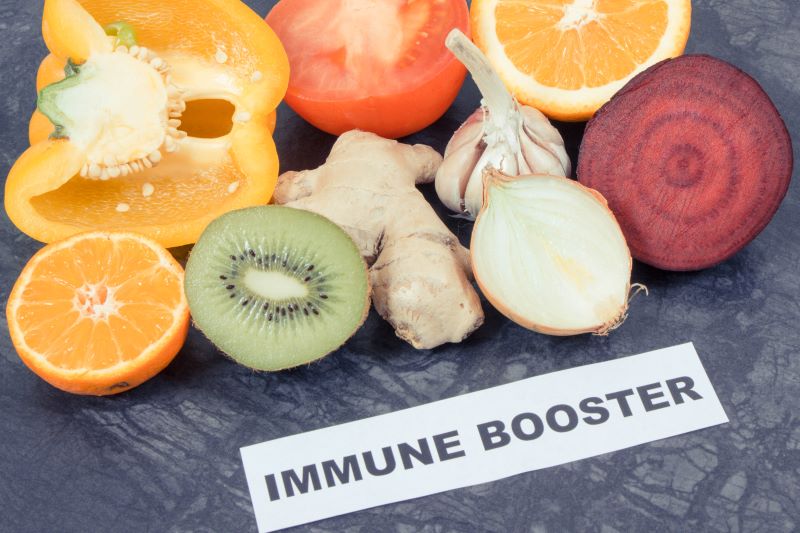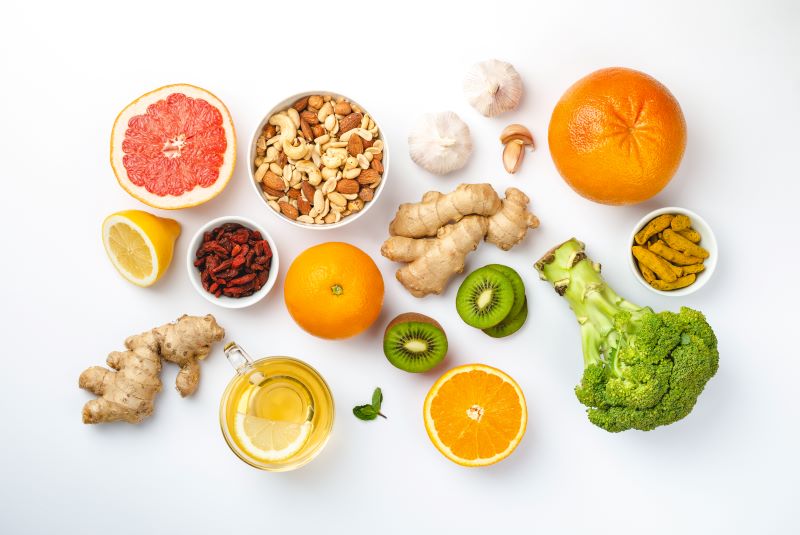37 Best Food Items to Boost Your Immunity

In today's quick life, having a healthy immune system for good health and physical fitness is very important. Certain foods should also be part of your meals to boost the human body's protection systems.
This guide gives a detailed list of foods famous for boosting immunity. These food selections can fortify your immune system, ensuring total resilience against diseases and infections as they range from bright-colored vegetables and fruits or slim meats alongside nourishing herbs.

Table of Content

What is Immunity?
Your resistance system comprises many organs, proteins, chemicals, and white blood cells that protect you from pathogens and other foreign materials that may invade your body. The immune system of your body assists in healing wounds and infections.
A strong and properly functioning immune system is essential for maintaining health and well-being. In contrast, a compromised immune system can increase susceptibility to infections, autoimmune disorders, and other health problems.
What Are the Types of Foods that Increase Immunity?
One cannot stress enough the importance of food in maintaining strong health and preventing diseases. Eating meals that boost the immune system is important to enhance our bodies' natural defences. These foods include high antioxidants in colourful fresh fruits and vegetables and proteins or herbs such as lean meat, which provide vital nutrients for good health and vitality.
List of Best Fruits that Boost Immunity

Few things are as universally cherished in health and wellness as the goodness of fruits. Beyond their tantalising flavours and vibrant colours, fruits are powerhouses of essential nutrients, antioxidants, and vitamins that play pivotal roles in fortifying our immune system.
SNo. |
Food | Description |
| 1 | Grapes | Grapes contain 4 mg of vitamin C, which is known to support healthy immunity. These fruits have little sugar content due to their high fibre content, helping one maintain normal blood sugar levels while keeping hydrated. |
| 2 | Oranges | Oranges have about 5300 mg of vitamin C. It is loaded with potassium, vitamin E, and the antioxidant lutein, all important for good eye health, as well as carotenoids for preventing macular degeneration. |
| 3 | Berries | A quarter (24%) of the recommended daily intake (RDI) of vitamin C. However, a cup of strawberries has roughly 150 mg of vitamin C. Antioxidants found in berries' vitamin C help to boost immunity and reduce inflammation. |
| 4 | Apples | These are a great source of vitamins, minerals, antioxidants, and nutritious fibres to defend your body from outside threats. One hundred grams of raw apples contain about 4.6 mg of vitamin C. |
| 5 | Papaya | A big papaya has 235 mg of vitamin C. It is also a great source of calcium, potassium, and vitamin A. It also has anti-inflammatory and abundant antioxidant qualities that strengthen immunity. |
| 6 | Kiwi | A medium kiwi fruit provides 230% of the recommended daily dose of vitamin C. It also contains antioxidants, fibre, and vitamins, which activate the body's immunological system. |
| 7 | Watermelon | Watermelons have 90% water content and help to maintain your body's moisture levels. Staying hydrated is crucial to maintaining a robust and functional immune system because it affects body temperature, organ function, metabolism, and other factors. |
| 8 | Mango | It has several essential elements, such as fibre, folate, vitamin C, and vitamin A. Mangoes supply 8% of your daily vitamin A and B6 requirements and 50% of your daily vitamin C value in a portion of about ¾ cup. |
| 9 | Pears | When changing the fruits in your daily diet, you can incorporate pears to better support your immune system. Pears are rich in folate, copper, potassium, and vitamin C, all of which are beneficial to your health. They also contain high levels of antioxidants, copper, and vitamin C. |
List of Best Vegetables That Boost Immunity

Vegetables are important for the body's protection. They are packed with a high concentration of essential nutrients such as minerals, fibre-related compounds (phytonutrients), and vitamins, which are proven to strengthen resistance.
SNo |
Vegetables | Description |
| 10 | Broccoli | Cooked broccoli has around ½ cups (50 mg) of vitamin C. It also contains calcium and vitamin K, which support healthy bones and guard against certain illnesses. |
| 11 | Garlic | One small garlic clove contains about 2.81 mg of vitamin C. Additionally, it lowers blood pressure by slowing down the artery-hardening process. |
| 12 | Ginger | It is frequently taken to treat the flu and the common cold. 5 mg of vitamin C is present in gingerr. It can help lessen chronic discomfort and has cholesterol-lowering qualities. |
| 13 | Spinach | A serving of cooked spinach contains 28.1 mg of vitamin C. Moreover, it is rich in beta-carotene and other antioxidants, which strengthen the immune system's capacity to combat infections. |
| 14 | Sweet Potatoes | These are abundant in vitamin A-producing beta-carotene, which shields the skin from UV radiation. They also contain potassium and vitamin C. |
| 15 | Red Bell Peppers | A cup of diced red bell pepper has over 190 mg of vitamin C. Additionally, it contains a lot of beta-carotene. It strengthens your immune system and contributes to better skin health. |
| 16 | Carrots | These spring veggies, which contain beta carotene and vitamin C, are best known for their ability to maintain healthy eyes, but they also boost immunity. |
| 17 | Asparagus | Vitamin E, a potent antioxidant found in this vegetable, boosts immunity and helps shield cells from the damaging effects of free radicals. |
| 18 | Raddish | Radishes are rich in vitamin C and contain antioxidants, minerals like potassium and calcium, and other nutrients that support a healthy immune system. |
| 19 | Peas | Peas are a popular springtime vegetable packed with immune-boosting vitamins C and E, zinc, and other antioxidants. |
| 20 | Avocados | Artichokes, high in fibre, potassium, iron, vitamins C and A, and antioxidants, can help maintain a healthy immune system. Additionally, they have a high natural concentration of polyphenols, which help heal damaged cells and boost immunity. |
| 21 | Artichokes | Artichokes, high in fibre, potassium, iron, vitamins C and A, and antioxidants, can help maintain a healthy immune system. Additionally, they have a high natural concentration of polyphenols, which help heal damaged cells and boost immunity. |
List of Best Poultry Items That Boost Immunity

When it comes to maintaining a strong immune system, protein-rich foods provide the building blocks necessary for immune function. We'll explore the best poultry items known for their immune-boosting properties.
SNo. |
Poultry Items | Description |
| 22 | Chicken | One of the most important poultry foods for boosting immunity is chicken. Chicken soup made with stock or broth fortifies the immune system. It has a slight anti-inflammatory impact. About 3 ounces of chicken provides the recommended daily intake of vitamin B6. |
| 23 | Turkey | Turkey is a nutritional powerhouse that can significantly boost immunity. Rich in high-quality protein, it provides the essential building blocks for the body's immune system, aiding in the repair and growth of tissues crucial for defence against pathogens. |
| 24 | Eggs | Eggs are rich in high-quality protein and provide essential amino acids for the growth and repair of tissues crucial for a robust immune system. Furthermore, eggs are one of the few dietary sources of vitamin D, a key nutrient known for its role in immune function regulation. |
List of Best Seafood That Boosts Immunity

Seafood has long been celebrated for its abundance of essential nutrients and health-promoting properties. From omega-3 fatty acids to vitamins and minerals, various seafood components play key roles in supporting immune function and overall well-being.
SNo. |
Seafood | Description |
| 25 | Salmon | Rich in omega-3 fatty acids, particularly EPA and DHA, salmon supports immune function by reducing inflammation and enhancing the activity of immune cells. |
| 26 | Sardines | Another fatty fish packed with omega-3, sardines provide a significant dose of these essential fatty acids, which play a vital role in maintaining a strong immune system. |
| 27 | Mackerel | Like salmon and sardines, mackerel is a fatty fish rich in omega-3 fatty acids, supporting immune function and reducing the risk of chronic diseases. |
| 28 | Oyster | Oysters are an excellent source of zinc, a mineral that plays a crucial role in immune function. Zinc helps support the development and function of immune cells, making it essential for a healthy immune system. |
| 29 | Crab | Like shrimp, crab is rich in selenium, making it beneficial for immune health. Additionally, crab provides protein and essential nutrients like vitamin B12, which supports the production of immune cells. |
| 30 | Shrimp | Shrimp is a good source of selenium, a mineral with antioxidant properties that help reduce inflammation and support immune function. |
| 31 | Cod | Cod is a lean fish that provides protein and essential nutrients like vitamin D, which regulates immune function and reduces the risk of infections. |
List of Other Food Items That Boost Immunity

While fruits, vegetables, poultry, and seafood are well-known for their immune-boosting properties, numerous other food items also play a crucial role in supporting immune function and overall health.
SNo. |
Food Items | Description |
| 32 | Green Tea | Flavonoids and epigallocatechin gallate (EGCG), two forms of antioxidants, are present in it. Additionally, it has the amino acid L-theanine, which helps T cells produce chemicals that fight germs. |
| 33 | Turmeric | When it comes to popular Indian dishes that improve immunity, one famous spice that has anti-inflammatory properties is turmeric. Additionally, it has curcumin, which might lessen the damage exercise causes to muscles. |
| 34 | Sunflower Seeds | These are packed with minerals, such as magnesium, phosphorus, and vitamins B-6 and E. The immune system can be strengthened and supported by vitamin E. |
| 35 | Almonds | Almonds are often consumed in an attempt to stave off colds. They contain vitamin E, which helps to strengthen immunity, and good fats. |
| 36 | Yoghurt | Vitamin D, which supports your body's natural defences against potential illnesses, is abundant in plain yoghurt. |
| 37 | Mushroom | Certain mushrooms, such as shiitake and maitake, contain beta-glucans, compounds that may enhance immune function by stimulating the activity of immune cells. |
How Does the Immune System Work?
The immune system is a complex network of cells, tissues, and organs that work together to defend the body against harmful pathogens. Its primary function is to identify and eliminate foreign invaders while distinguishing them from the body's healthy cells.
- Recognition: The immune system constantly monitors the body for signs of foreign invaders. Specialised antigen-presenting cells (APCs) patrol the body, engulfing foreign particles or pathogens.
- Activation: Once an antigen (foreign substance) is captured by an APC, it presents the antigen to other immune cells called T cells. This triggers the activation of T cells, which then coordinate the immune response by releasing chemical signals called cytokines.
- Response: Depending on the type of pathogen encountered, the immune system mounts either an innate or adaptive immune response. The innate immune response is the body's first line of defence.
- Elimination: Once activated, immune cells work together to eliminate the invading pathogen. Antibodies bind to antigens on the surface of pathogens, marking them for destruction by other immune cells.
- Memory: After an infection is cleared, some immune cells remain in the body as memory cells. These cells "remember" the specific pathogen and mount a faster and more effective response if the same pathogen is encountered again.
What are the Types of Immunity?
When a person's system contains antibodies against the disease, they become immune. The body produces antibodies, which are proteins, to neutralise or eliminate toxins or pathogens that cause sickness. For instance, a person exposed to the measles virus will be protected by measles antibodies; however, they will not be protected if exposed to the mumps.
Immunity is of two types: active and passive.
1. Active Immunity
Active immunity is when the immune system produces antibodies against a diseased organism after exposure. Both naturally occurring immunity and immunity produced by vaccinations can result in active immunity.
Exposure to the disease organism through actual disease infection results in the development of natural immunity.
Immunity induced by vaccination is obtained by exposing the recipient to a weakened or dead version of the pathogen.
In any case, an immune person's immune system will identify the disease and start producing the necessary antibodies as soon as they come into contact with it in the future. Active immunity lasts for a lifetime.
2. Passive Immunity
When a person receives antibodies to a disease instead of making them themselves through the immune system, this is called passive immunity.
Through the placenta, a newborn baby receives passive immunity from its mother.
Passive immunity can also be acquired by blood products containing antibodies, such as immune globulin, administered when prompt protection against a particular disease is required.
The main benefit of passive immunity is that it provides protection instantly, while active immunity takes a while (sometimes several weeks) to develop. Passive immunity, however, wears off after a few weeks or months. It is only active immunity that lasts a lifetime.
Health Conditions that Impact Our Immune System
The immune system serves as the body's fortress, defending against various threats ranging from bacteria and viruses to cancer cells and allergens. However, certain health conditions can disrupt the delicate balance of this intricate defence mechanism, leaving us vulnerable to infections, autoimmune disorders, and other immune-related challenges.
- Allergies: Your body reacts to a typically harmless substance called an allergy. When that material is present, your immune system overreacts, resulting in symptoms ranging from minor to severe.
- Illnesses Triggered by Antibodies: These disorders develop when your immune system unintentionally targets its healthy cells. Typical autoimmune disorders include rheumatoid arthritis and lupus.
- Illnesses Causing Primary Immunodeficiency: Certain hereditary disorders can cause your immune system to not function as it should, increasing your susceptibility to infections and specific illnesses.
- Infectious Diseases: When bacteria enter your body, they multiply and cause harm, leading to infectious diseases. Examples of infectious disorders that impair immunity and can cause significant sickness include HIV and mononucleosis (mono).
- Cancer: Leukaemia and lymphoma are two cancers that might impair your immune system. This is due to the possibility of cancer cells spreading to or growing in your bone marrow from another location.
- Sepsis: A severe immunological reaction to infection is known as sepsis. Your immune system begins to harm organs and healthy tissues. This results in inflammation throughout your body that could be fatal.
Immune System Dysfunction Signs and Indicators
Immune system dysfunction can occur, leading to various signs and indicators that may signal compromised immune function. Understanding these warning signs, from recurrent infections to autoimmune disorders, is crucial for recognising potential immune-related issues and seeking appropriate medical attention.
Feeling fatigued all the time.
Fever without a cause.
Unaccounted-for weight loss.
Sultry night sweats.
Skin irritation.
Aching, sore muscles.
Tingling or numb fingers or toes.
Difficulty focusing or being attentive.
Hair fall.
Redness, rashes, or inflammation on any part of your body.
Enlarged lymph nodes in the groin, armpits, or neck.
Incorporating immune-boosting foods into your diet can greatly enhance your body's natural defence system. The choices are plentiful, from vibrant fruits and vegetables rich in vitamins and antioxidants to wholesome grains and lean proteins. By prioritising nutrient-dense options and maintaining a balanced diet, you can support your immune health and overall well-being.













